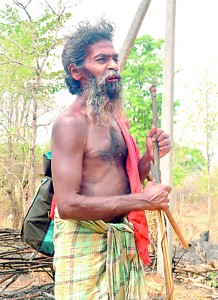News
Veddas’ votes are hunted, but they want to hunt too
Roads to the veddah village of Dambana are under construction. Sand piles and tar barrels line the way, and there are newly-planted electricity poles – but without wires. Posters in red, green and blue stand out among the poles and tar barrels.

Uru Warige Hudubandiya: Politicians have promised electricity; only the electricity posts are up. Pic by Nissanka Meegoda
With the Uva Provincial Council elections around the corner, the people of this village are seeing sudden changes to their neighbourhood but they hold no high expectations of meaningful change in their hard lives.
There are 375 families in the Dambana Vedda community, with about 1000 persons eligible to vote. Nearly all of them are farmers. They had mixed feelings about the parties soliciting their votes.
“What is the use in voting at all? They make vain promises, take our votes and do not come back till the next elections,” said 45-year-old Uru Warige Landa, father of four.
He said they expected the authorisation to hunt freely in the surrounding jungle that they received during previous elections.
“When they forbade us from going into the forest and made Madura Wewa a forest reserve we lost everything. Now we have to stay in the village and do what is ‘legal’,” he said.
Because of the drought the villagers only bathe once a week and must travel a long distance to fetch water for cooking. Each house has a well but because of the drought there is hardly any water left in the wells. There are only two tube wells for the whole village, and they are gradually running dry.
“We don’t have basins to store the water. It’s been six months since our wells started to dry up. We walk a long way to get the water to fill our pot,” said 34-year-old Uru Warige Manike.
The villagers hold little hope that their basic need for water will be met by the politicians.
And although water is a pressing problem, the veddahs ask for only one thing: the right to hunt.
“We want to hunt like our ancestors did. That is how we lived. We were happy then. We hunted and went to get honey in the forests. Now our life has changed. They have given us land to cultivate. I have two acres, but nothing grows on this land any more. The fertilisers and pesticides have killed the soil,” said 64-year-old Uru Warige Hudubandiya, father of six.
He said that because of this they hunt illegally in the forest. If caught, they will be taken to court and fined. Not all want to take the risk.
The villagers said that four or five years ago a licensing system was introduced where a limit of five licence holders could enter the forest, unarmed, to collect honey and medicinal plants. They were allowed to stay in the forest from 6am to 6pm but they were not allowed to hunt.

